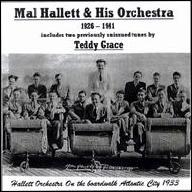Born in Roxbury, Massachusetts in 1893 and a graduate of the Boston Conservatory of Music, he toured France with Al Moore's orchestra during the First World War and made his first record as a leader -- a Victor test pressing -- in 1922. His Pathe recordings of 1926 include She's a Cornfed Indiana Girl sung by John Ryan, best remembered as the vocalist on a recording of Maceo Pinkard's Sugar by Frankie Trumbauer and Bix Beiderbecke. It was during the autumn of 1926 that Hallett's band engaged in two separate cutting sessions in Massachusetts, first at the Lyonhurst Ballroom in Marlboro and then at Nuttings-on-the-Charles at Waltham. At that point, Hallett was certainly riding high, having prevailed during similar competitions with more than 25 different bands.
The Columbia sessions of 1927 featured vocalists Frank Marvin and Tess Gardella, an Italian-American who often performed in blackface billed as Aunt Jemima. Hallett's band as recorded by Edison in 1929 included valve trombonist Brad Gowans (who also handled cornet and clarinet) and reedman Toots Mondello. Hallett had old-fashioned ideas about entertainment and incorporated novelty tropes into the show, sometimes using bassist Joe Carbonero's comedic talents to break the ice. Trombonists who passed through his band in the early '30s were Floyd O'Brien, Jack Jenney, and Jack Teagarden, who served briefly in Hallett's brass section just before joining Paul Whiteman's orchestra. The band Hallett brought into the studios to record for Vocalion and Decca included trombonist Turk Murphy, pianist Frankie Carle (featured on Hallett's 1937 recording of Antonin Dvorak's Humoresque), and trumpeter Mickey McMickle, who went on to become one of Glenn Miller's celebrated bandsmen.
Those who sang with Hallett in the mid- to late ‘30s included Teddy Grace, Jerry Perkins, saxophonist Buddy Welcome, and guitarist Clark Yocum, who soon became a cardinal member of the pop vocal group known as the Pied Pipers. Although Hallett's band had at one time wowed dancers in ballrooms, by 1942 the ballroom affiliation had become a liability according to a rather cynical Billboard reviewer, who described Hallett's Decca recording of I Left My Heart at the Stage Door Canteen as burdened by tempos "long associated with the barnstorm bands". Frustrated by stymied success and eclipsed by younger bandleaders who appealed to younger audiences by playing an instrument in the spotlight, Hallett grappled with alcoholism, had to give up playing the violin after injuring his arm during a drunken mishap, and passed away in Boston on November 20, 1952. A good sampling of Hallett's work dating from 1926-1937 was released by Swing Time in 2000. A truly comprehensive overview of his legacy has yet to appear. ~ arwulf arwulf, Rovi












